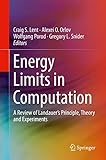Energy Limits in Computation [electronic resource] : A Review of Landauer’s Principle, Theory and Experiments / edited by Craig S. Lent, Alexei O. Orlov, Wolfgang Porod, Gregory L. Snider.
Contributor(s): Lent, Craig S [editor.] | Orlov, Alexei O [editor.]
| Orlov, Alexei O [editor.] | Porod, Wolfgang [editor.]
| Porod, Wolfgang [editor.] | Snider, Gregory L [editor.]
| Snider, Gregory L [editor.] | SpringerLink (Online service)
| SpringerLink (Online service) .
.
Material type:  BookPublisher: Cham : Springer International Publishing : Imprint: Springer, 2019Edition: 1st ed. 2019.Description: XIV, 237 p. 68 illus., 40 illus. in color. online resource.Content type: text Media type: computer Carrier type: online resourceISBN: 9783319934587.Subject(s): Electronic circuits
BookPublisher: Cham : Springer International Publishing : Imprint: Springer, 2019Edition: 1st ed. 2019.Description: XIV, 237 p. 68 illus., 40 illus. in color. online resource.Content type: text Media type: computer Carrier type: online resourceISBN: 9783319934587.Subject(s): Electronic circuitsChapter1: Information and Entropy in Physical Systems -- Chapter2: Conditional Erasure and the Landauer Limit -- Chapter3: Second law, entropy production, and reversibility in thermodynamics of information -- Chapter4: The Thermodynamics of Computation: A Contradiction -- Chapter5: The physics of information: from Maxwell to Landauer -- Chapter6: Experimental Tests of the Landauer Principle in electron circuits, and quasi-adiabatic computing systems.
This book is a single-source reference to the issues involved in the Landauer principle, which has gained new prominence recently, due to the large amount of heat generated by today’s computers. If Landauer’s principle is correct, there may be ways to build computers that dissipate far less power (corresponding to heat generated) than today’s computers. This book brings together all sides of the discussions regarding Landauer’s principle, both theoretical and experimental, empowering readers to gain better understanding of dissipation in computation, and the limits if any to progress in computation related to energy dissipation. It represents the best and most thorough examination of the important issue of Landauer’s principle that is available in one volume. Provides an in-depth investigation of the Landauer principle and how it relates to the possible existence of lower bounds on dissipation in computation; Gathers together both sides of the discussion: those who agree with Landauer and his conclusions, and those who think that Landauer was not correct, offering fresh perspective on the issues in the new light of experiments; Offers insight into the future of silicon CMOS and the limits if any to progress in computation related to energy dissipation.


There are no comments for this item.